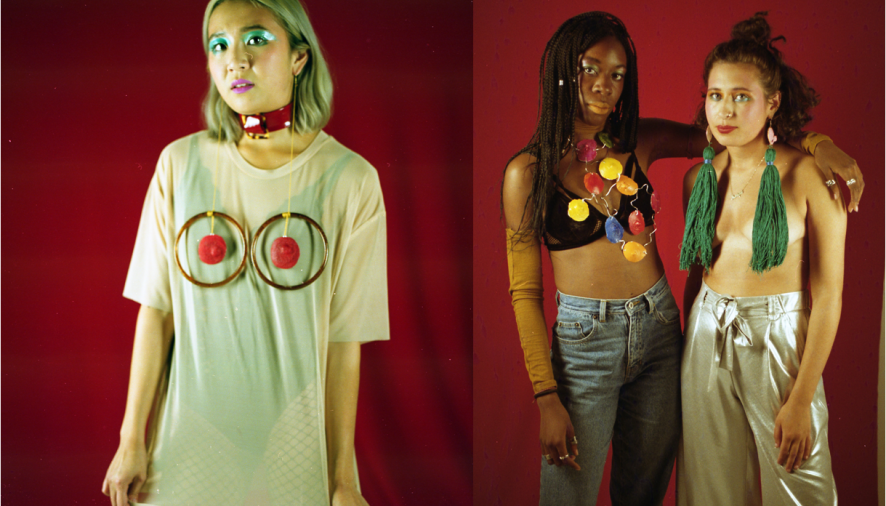Inspired by the Free The Nipple campaign, Josie Partridge has created Nipple-Bocker-Glory, a jewellery range created using casts of nipples in all shapes and size. Here she talks to editor-in-chief Jessica Murray about inclusive feminism, body shaming and her grandma’s 84-year-old nipples…
It’s been two years since the Free The Nipple campaign first took off, sparking events and campaigns around the country, especially among feminist groups at universities. Here at Leeds we had a ‘Boobie Booth’, with students encouraged to bare all for the camera in an attempt to normalise the nipple and combat body shaming.
Like a lot of campaigns in the 21st century, the movement became something of a trend, with #freethenipple having appeared on Instagram over 3 million times now. But while the issue may have faded from the limelight, Josie Partridge argues that it’s just as important as ever.
“There’s still a long way to go. We still live in a society where globally there is so much gender inequality. Women are vulnerable. They’re vulnerable to sexual assault, even if it’s just cat calling on the street, domestic abuse or rape. We live in a world where in the media women’s bodies are objectified and used to make profit. On the internet and in films violence is glorified but then women breastfeeding is considered inappropriate.”
It was this contradiction between the reality of the female body and its sexualised portrayal that inspired Josie, a final year Fashion Design student at Leeds College of Art, to create her own jewellery range. Except this is a jewellery range with a twist – a nipple twist actually. Josie uses casts of women’s nipples to make earrings and necklaces in all shapes, colours and sizes.
The Free The Nipple movement, and third-wave feminism in general, is often associated with certain groups in society, but Josie asserts she “wanted to capture the diversity of women, because the movement has been criticised for only including the socially prescribed ideals of beauty.”
“I wanted to capture nipples whether they’re big, small, inverted, hairy, bumpy, pierced, lactating, masectomised, or anything else in between to promote body positivity.”
Her pieces are bold, striking and garish, deliberately designed to provoke thought. Sitting across from me in an effortlessly stylish outfit and eye-catching red lipstick, Josie exudes a quiet but fierce and educated determination. “For me as a fashion designer, going into the most objectifying industry, it’s really important to make work that sends a message and promotes positive social change. With it, I wanted to challenge people’s perception of the socially accepted ideal of beauty, and I want to provoke thought. I wanted them to think about why men’s nipples are acceptable when women’s aren’t.” I find it heartening to see a student taking a stand against the injustices of the industries she’s seeking a career in.
The most enjoyable thing about the project, she says, is the overwhelmingly positive response she’s received from her customers, friends, and family. “Older people are quite horrified; they raise their eyebrows or nervously laugh. Apart from my grandma who bought a pair of her own 84-year-old nipples! My mum finds the whole idea really empowering because she’s a breast cancer survivor, and she says she would have loved to have had her nipple cast before she had a mastectomy. Breast feeding women think it’s a lovely opportunity to have a reminder of their enlarged lactating nipples.”
The only negative reaction she’s received has come from Instagram itself, when her account was disabled due to what she can only assume were her nipple photos. “Instagram is famous for having a strict censorship around women’s nipples which perpetuates the idea that women’s breasts are pornographic, and that women should cover up their bodies to avoid objectification and to gain respect. Instead it should be men changing their views on women, rather than us covering up and being ashamed of our bodies.” Instagram is famous for its aesthetic filters, but as young people who increasingly live our lives through such platforms, we rarely stop to think how they might be filtering our view of the world.
The name of the venture itself, Nipple-Bocker-Glory, apart from being a brilliant pun, is also a play on the idea that women’s bodies are offered up to men as a sweet treat for consumption. When I ask Josie whether she thinks her work can be seen as superficial and unnecessary, in a world where more important aspects of gender inequality still need to be tackled, she keeps her composure to produced a well-considered response.
“People are scared of change – campaigns, new laws that are enforced. At first people might find them unnecessary and silly, and it’s only when you look back at all the things that have happened in the last century that you think that it was really necessary. I’m really aware that it can seem like a superficial thing when there are so many more issues with gender inequality. But in a society that is increasingly more materialistic and more and more focused on image, this seems like a good place to start.” I have to admit I’m impressed; I started this interview thinking of nipple jewellery as funny and quirky, but the message behind the project is more empowering and inspiring than I expected.
While Josie is about to knuckle down for her final year of university, she hopes to run with the venture once she’s graduated, and work with breast cancer patients and breastfeeding mothers. Her work is both socially empowering and fashionably striking, and she hopes that everyone who wears it follows the Nipple-Bocker-Glory philosophy.
When I ask her to some this up in a nutshell, she says, “Women shouldn’t feel that they have to cover up their bodies, and that modest dress is the answer to desexualising the female body.”
Jessica Murray

